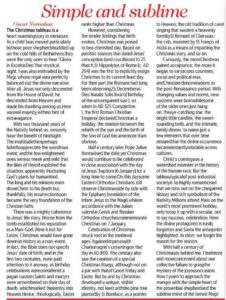 The Christmas tableau is a heart-warming story in miniature. As a child I was moved particularly by those poor shepherds huddled up on the cold hills of Bethlehem; they were the only ones to hear “Gloria in Excelsis Deo” that mystical night. I was also enthralled by the Magi, whose regal aura perfectly balanced out the divine narrative. After all, Jesus not only descended from the House of David, he descended from Heaven and made his dwelling among us. Here was real majesty, with no hint of extravagance.
The Christmas tableau is a heart-warming story in miniature. As a child I was moved particularly by those poor shepherds huddled up on the cold hills of Bethlehem; they were the only ones to hear “Gloria in Excelsis Deo” that mystical night. I was also enthralled by the Magi, whose regal aura perfectly balanced out the divine narrative. After all, Jesus not only descended from the House of David, he descended from Heaven and made his dwelling among us. Here was real majesty, with no hint of extravagance.
With two thousand years of the Nativity behind us, we surely have the benefit of hindsight. The multitude then perhaps failed to appreciate the wondrous event; and the few enlightened ones were so meek and mild that the likes of Herod exploited the situation, apparently frustrating God’s plans for humankind. The king and his minions even drove Christ to his death but, thankfully, his resurrection soon became the very foundation of the Christian faith.
There was a mighty coherence to Jesus’ life story. His rise from the tomb established his reputation as a Man-God. Were it not for Easter, Christmas would have gone down in history as a non-event. In fact, the Bible does not specify Jesus’ date of birth; and in the first two centuries, none paid attention to it anyway, as birthday celebrations were considered a pagan custom. Saints and martyrs were remembered on their day of death, which marked their entry into Heaven. Hence, theologically, Easter ranks higher than Christmas.
However, considering the tender feelings that birth evokes, Christmas was poised to be a cherished day. Based on patristic sources that dated Jesus’ conception (and crucifixion) to 25 March, St Hippolytus of Rome (c. AD 204) was the first to explicitly assign Christmas to its current feast day. For their part, the Romans had long been observing 25 December as Dies Natalis Solis Invicti (‘birthday of the unconquered sun’), so when in AD 325 Constantine I, the first Roman Christian Emperor, declared Christmas a holiday, the relation between the rebirth of the sun and the birth of the Son of God became more than obvious.
Half a century later, Pope Julius I formalised the date; yet Christmas would continue to be celebrated in close association with the day of Jesus’ baptism (6 January) for a long time to come. On this day some Eastern Orthodox Christians still observe Christmas side by side with the (revelation of the Infant Jesus to the Magi), while in accordance with the Julian calendar, Greek and Russian Orthodox churches commemorate Christmas on 7 January.
Celebration of Christmas struck root in the medieval ages. It gained impetus with Charlemagne’s crowning on that day in AD 800. The century also saw the creation of a special Christmas liturgy, although not on a par with that of Good Friday and Easter. But by and by Christmas developed a unique, visible identity, not least with the pine tree planted by St Boniface, as a pointer to Heaven; the old tradition of carol singing that was lent a heavenly form by St Bernard of Clairvaux; the crib, invented by St Francis of Assisi as a means of imparting the Christmas story, and so on.
Curiously, the more Christmas gained acceptance, the more it began to vary across countries, social and political eras, and Christian denominations in the post-Renaissance period. With changing values and norms, new customs were born while some of the older ones just hung on: the eye-catching star, the bright little candles, the sweet-sounding bells, and the intimate, family dinner, to name just a few elements that over time ensured that the divine occurrence became instantly relatable across cultures.
Christ’s coming was a watershed moment in the history of the human race. But the tableau typical of post-industrial society is so highly romanticised that we miss out on the chequered history and rich symbolism of the Nativity. Millions attend Mass on the world’s most prominent holiday, only to top it up with a secular, not to say raucous, celebration. Here the divine protagonist is easily forgotten and Santa the antagonist highlighted. In short, we forget the reason for the season.
With half a century of Christmases behind me, I feel more and more concerned about our collective failure to grasp the mystery of the joyous occasion. How I yearn to approach the manger with the simple heart of the proverbial shepherd and the sublime mind of the famed Magi!
(Herald, 23.12.2019)